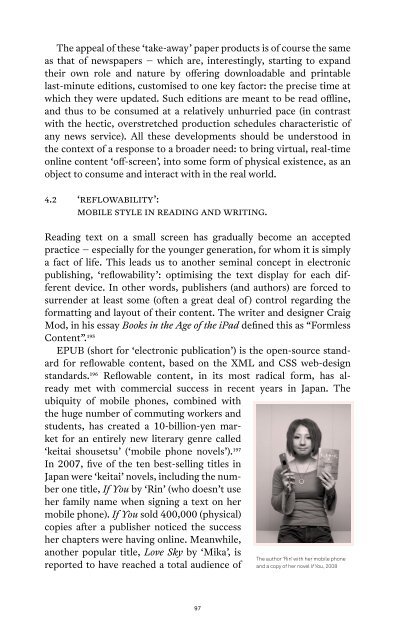Post- Digital Print - Monoskop
Post- Digital Print - Monoskop
Post- Digital Print - Monoskop
Create successful ePaper yourself
Turn your PDF publications into a flip-book with our unique Google optimized e-Paper software.
The appeal of these ‘take-away’ paper products is of course the same<br />
as that of newspapers – which are, interestingly, starting to expand<br />
their own role and nature by offering downloadable and printable<br />
last-minute editions, customised to one key factor: the precise time at<br />
which they were updated. Such editions are meant to be read offline,<br />
and thus to be consumed at a relatively unhurried pace (in contrast<br />
with the hectic, overstretched production schedules characteristic of<br />
any news service). All these developments should be understood in<br />
the context of a response to a broader need: to bring virtual, real-time<br />
online content ‘off-screen’, into some form of physical existence, as an<br />
object to consume and interact with in the real world.<br />
4.2 ‘reflowability’:<br />
mobile style in reading and writing.<br />
Reading text on a small screen has gradually become an accepted<br />
practice – especially for the younger generation, for whom it is simply<br />
a fact of life. This leads us to another seminal concept in electronic<br />
publishing, ‘reflowability’: optimising the text display for each different<br />
device. In other words, publishers (and authors) are forced to<br />
surrender at least some (often a great deal of ) control regarding the<br />
formatting and layout of their content. The writer and designer Craig<br />
Mod, in his essay Books in the Age of the iPad defined this as “Formless<br />
Content”. 195<br />
EPUB (short for ‘electronic publication’) is the open-source standard<br />
for reflowable content, based on the XML and CSS web-design<br />
standards. 196 Reflowable content, in its most radical form, has already<br />
met with commercial success in recent years in Japan. The<br />
ubiquity of mobile phones, combined with<br />
the huge number of commuting workers and<br />
students, has created a 10-billion-yen market<br />
for an entirely new literary genre called<br />
‘keitai shousetsu’ (‘mobile phone novels’). 197<br />
In 2007, five of the ten best-selling titles in<br />
Japan were ‘keitai’ novels, including the number<br />
one title, If You by ‘Rin’ (who doesn’t use<br />
her family name when signing a text on her<br />
mobile phone). If You sold 400,000 (physical)<br />
copies after a publisher noticed the success<br />
her chapters were having online. Meanwhile,<br />
another popular title, Love Sky by ‘Mika’, is<br />
reported to have reached a total audience of<br />
97<br />
The author ‘Rin’ with her mobile phone<br />
and a copy of her novel If You, 2008

















